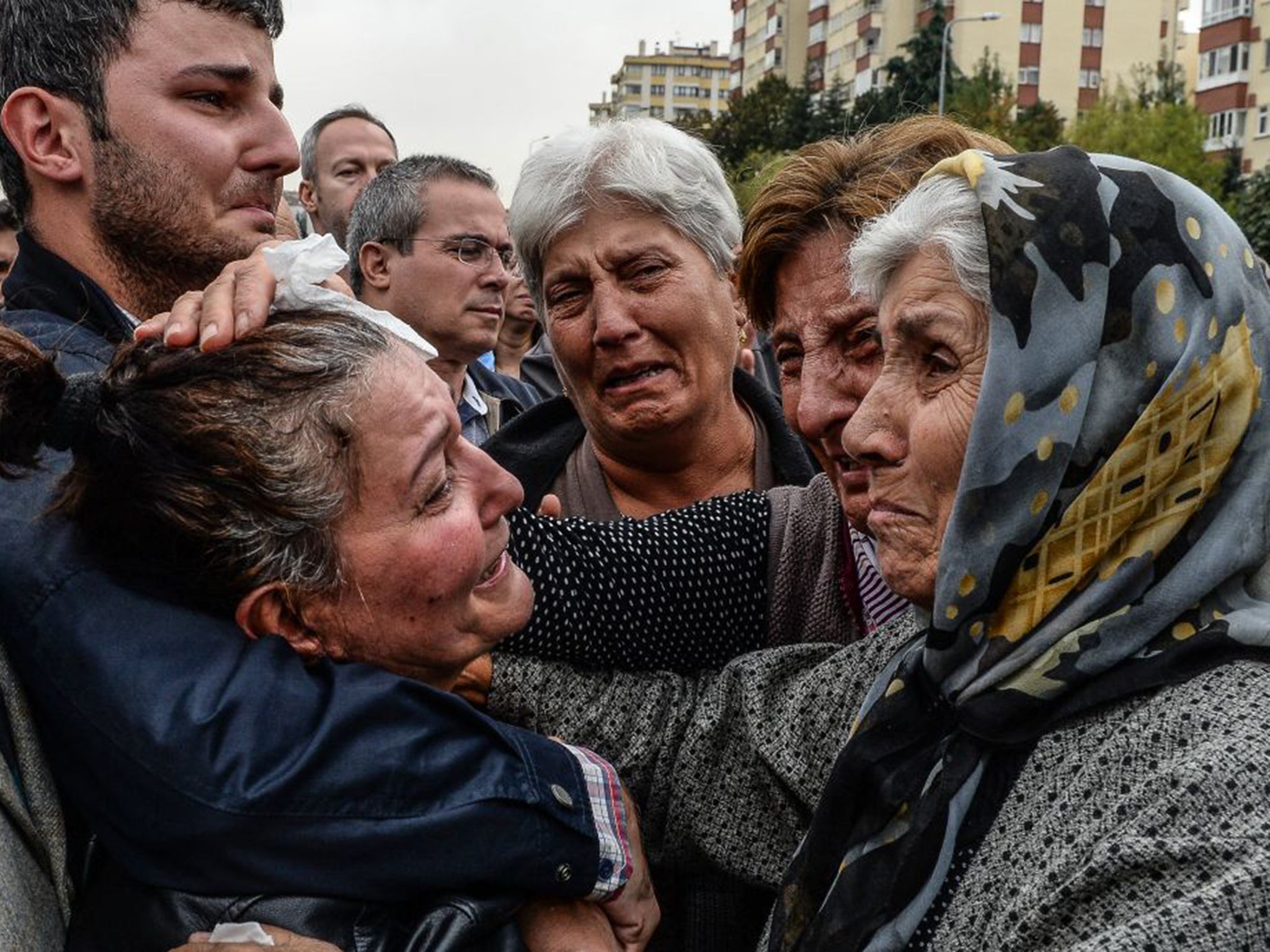Ankara bombing: Turkey's leaders search for answers and trade blame as citizens accuse state of failing them
Leaders of the banned PKK group have said they will maintain the ceasefire it announced on Saturday in honour of the peace rally’s victims

For three nights, Nur slept on a bench outside the emergency ward of Ankara’s Numune Hospital, where many of the maimed, dead and dying were taken after two suicide bombers detonated their explosive at a peace march in Turkey’s capital.
The two friends, both taxi drivers, had dropped off marchers on Saturday when explosions tore through the crowd, killing at least 97 people and injuring some 200 others. Nur had left to buy coffee, but his colleague was hit by shrapnel that took eight hours and multiple surgeries to remove. His life still hangs in the balance.
“He’s in a critical condition and still unconscious. I thought they might have to amputate his leg, but they saved it,” said Nur, who drove wounded protesters to hospital in his taxi before ambulances reached the scene. “There’s no one here for him but me.”
While the country’s political leaders search for answers and trade blame, dozens of protesters are still in intensive care after the deadliest terror attack in the country’s modern history. “We’re getting used to terror. It’s been like this for 30 years,” said a senior doctor at Numune Hospital, who asked to remain anonymous. “But it’s never come so close to home.”
No group has claimed responsibility, but Prime Minister Ahmet Davutoglu has named Isis as the prime suspect in Saturday’s attack. He told a Turkish television channel that authorities were close to identifying one of the bombers. “Looking at how the incident took place, we are probing Daesh as our first priority,” Davutoglu said, calling Isis by its Arabic acronym.
On the weekend, police sources told Turkey’s Haberturk newspaper that the type of explosives and the target of the attack pointed to an Isis-affiliated group based in the southern Adiyaman province. However, Mr Davutoglu added that authorities were also continuing to investigate the banned Kurdistan Workers’ Party (PKK) and the leftist terror group DHKP/C as “potential suspects”. The investigation has been marked as secret.
Leaders of the PKK have said the group will maintain the ceasefire it announced on Saturday in honour of the peace rally’s victims. “We are obliged to maintain this halt to hostilities, without succumbing to doubt, as a legacy for those (killed in Ankara),” the Firat news agency reported Murat Karayilan, the group’s acting leader, as saying in a radio broadcast to the PKK’s militants in Turkey and Iraq.
However, violence in Turkey’s southeast has resumed, with a nine-year-old child and a police officer reportedly killed during clashes between Turkish security forces and militants in Diyarbakir.
The second of three days of national mourning also saw a second day of protests against the government and President Recep Tayyip Erdogan at funerals and union marches. Opposition groups are accusing the state of failing to prevent the attack, a charge Ankara denies.
A man from Erzincan, who waited outside Numune Hospital for news about a 24-year-old family friend, echoed the view of many whose relatives were killed or wounded in the attack. “This is the fault of the state,” he said, adding that police officers tear-gassed and blocked protesters who tried to help the injured.
Funerals across the country on Monday were accompanied by anti-government chants, with mourners shouting “thief, murderer, Erdogan”.
Ankara explosions - in pictures
Show all 15Several trade unions, which organised Saturday’s peace rally, called for strikes and protests. Members of Turkey’s Medical Association marched to the site of the bombings but were prevented from laying flowers at the scene.
In a sign of deep political polarisation in the wake of Saturday’s attacks, MPs of the opposition parties CHP and HDP paid their respects at the ceremonies while officials from Mr Erdogan’s long-ruling AKP did not attend.
Mr Erdogan, whose critics accuse him of pursuing an increasingly divisive course, has remained quiet in the aftermath of the bombings besides issuing a statement on Saturday, despite usually dominating the national debate in times of crisis.
The pro-Kurdish HDP, which believes it was the main target of the attack, has put the death toll at 128 and said it had identified all but eight of the victims. The party’s leaders have accused the AKP of stoking tensions ahead of elections on 1 November to to win back the parliamentary majority that eluded them in June.
I don’t understand how anyone could attack a peace rally
The Ankara bombings reminded many of the deadly attacks on a HDP rally in Diyarbakir and an activist group in Suruc this summer, which were also blamed on Isis. In a statement released on Monday, the HDP said there were “clear links” between the three attacks, adding: “Our electorates feel under constant threat in every social space and political activity they attend.”
Saturday’s marchers had planned to protest the ongoing conflict between Kurdish militants and Turkish security forces in the country’s southeast. Many in Ankara still struggle to comprehend why anyone would bomb a peace gathering.
“This wasn’t a rally for any particular group - there was us, there were other parties, there were leftists and unions and doctors and lawyers. The subject was peace, nothing else,” said Turan Baykan, chairman of an Ankara-based HDP committee. “I don’t understand how anyone could attack that.”
Subscribe to Independent Premium to bookmark this article
Want to bookmark your favourite articles and stories to read or reference later? Start your Independent Premium subscription today.

Join our commenting forum
Join thought-provoking conversations, follow other Independent readers and see their replies